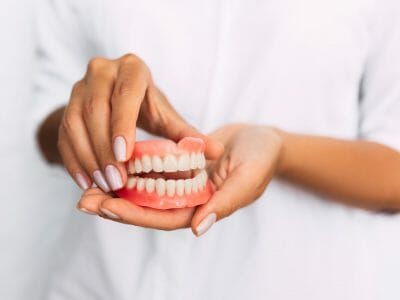Dentures
 What are dentures?
What are dentures?
Dentures are removable replacements for missing teeth. Sometimes referred to as “false teeth,” dentures have existed for centuries and even George Washington wore dentures!
How are dentures made?
Dentures are custom-crafted for each patient using impressions taken of the patient’s mouth.
While dentures are highly personalized for each patient, there are two basic types of dentures to choose from: full and partial dentures. The distinction between a full and partial denture depends on how many teeth are missing.
At Dentistry of West Bend, we are proud to provide the highest quality custom-made dentures, ranging from conventional full dentures to partial dentures, and the newer “snap-in” dentures that stay fixed in place for much longer by attaching to implants.
A conventional full denture is typically crafted using an impression of the patient’s gum line taken after all teeth have been extracted and the gums have healed. The full denture consists of an acrylic base that is flesh-colored and fits over your gums. In most cases, the roof of the upper denture is molded to the roof of your mouth, providing a snug fit, while the lower denture is crafted in a horseshoe shape to allow space for the tongue.
Each full denture is designed to fit snugly over your gums. Patients typically insert the dentures when they get up in the morning and wear them all day, then remove them in the evening upon retiring.
A partial denture is similar to a full denture but is designed to replace only a few teeth as opposed to a full arch. Partial dentures typically contain a plastic or metal hook that is used to anchor the denture to adjacent teeth to stabilize it in your mouth. These adjacent teeth must be stable enough to support the partial denture, or they must be covered with crowns to stabilize them. While a partial denture is similar to a fixed bridge, partial dentures are removable.
How long will it take before dentures feel normal?
It may take several weeks for you to fully adjust to eating and speaking with dentures in your mouth. If at any time you experience discomfort, irritation, chafing or slipping of the denture while you eat or talk, contact our office and Dr. Harding will be happy to adjust your denture and make it fit more snugly and comfortably.
Do dentures require any special care?
Dentures require proper care, and you should plan to have them adjusted, repaired, or remade periodically to accommodate the natural changes that occur in the mouth with aging. These changes may cause your dentures to fit more loosely over time, affecting your ability to chew or speak, or they may cause chafing and irritation of your gums. If you experience any discomfort while wearing dentures, please contact our office so that Dr. Harding can adjust your dentures and restore their comfort and functionality.
